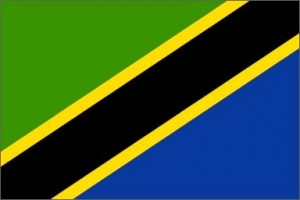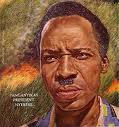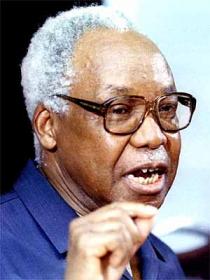October 14.
 Julius Nyerere was born in 1922 just east of Lake Victoria in what was then Tanganyika. He herded sheep and “led a typical tribal life” in the village where his father was chief of a small tribe.
Julius Nyerere was born in 1922 just east of Lake Victoria in what was then Tanganyika. He herded sheep and “led a typical tribal life” in the village where his father was chief of a small tribe.
He began school at age 12 and studied to be a teacher at Makerere University in Uganda. After teaching for three years he received a scholarship to the University of Edinburgh.
He taught English, Swahili, and history in Dar es Salaam, and was elected head of the Tanganyika African Association, which he had helped to form as an undergraduate at Makerere.
Under his leadership TAA transformed into the Tanganyika African National Union (TANU) a political force dedicated to Tanganyikan independence. As his reputation grew colonial leaders pressured him to choose between teaching and politics. Though he chose politics, his supporters would call him Mwalimu, or “teacher,” for the rest of his life.

Nyerere traveled to New York to speak to the United Nations on Tanganyikan independence on behalf of the TANU, which became the most powerful political coalition in the country. In the late 1950s, Tanganyika won independence and Nyerere was elected its first president.
As President, Nyerere helped unite Zanzibar and Tanganyika, forming Tanzania. He was controversial in the West for increasingly distancing himself and the country from European governments and leaning more toward Communist China. For instance, his transformed the age-old African concept of Ujamaa (Familyhood) into an economic policy, melding socialism with traditional tribal government.
“Nyerere reasoned that political independence would have to be followed by quick material development, which, in turn, rested heavily on Western aid. What Nyerere did not wish to import from the West was the individualistic, self-seeking, acquisitive character of its capitalism…”
A few years before his death he gave an interview to Charlayne Hunter-Gault:
CHG: You mentioned the one-party rule in your country where you were president for four terms during which time you promoted the principle of “Ujamaa,” socialism, and you have acknowledged that it was a miserable failure…
NYERERE: Where did you get the idea that I thought “Ujamaa” was a miserable failure?
CHG: Well, I read that you said socialism was a failure…
NYERERE: A bunch of countries were in economic shambles at the end of the 70s. They are not socialists…You have to take in the values of socialism which we were trying to build in Tanzania in any society.
CHG: And those values are what?
NYERERE: And those values are values of justice, a respect for human beings, a development which is people-centered, development where you care about people. You can say ‘leave the development of a country to something called the market,’ which has no heart at all since capitalism is completely ruthless. Who is going to help the poor? And the majority of the people in our countries are poor. Who is going to stand for them? Not the market. So I’m not regretting that I tried to build a country based on those principles…Whether you call them socialism or not…what gave capitalism a human face was the kind of values I was trying to sell in my country.
In a time when so many of his contemporaries clung to power until losing it by coup, Nyerere chose to step down in 1985.
He died of leukemia on October 14, 1999. Today, on the anniversary of his death, the people of Tanzania remember Nyerere, his extraordinary leadership, and the principles on which Tanzania was founded.



Excellent blog here! Additionally your web site rather a lot up very fast! What host are you the usage of? Can I get your affiliate link to your host? I wish my site loaded up as quickly as yours lol
ni vizuri tukamkumbuka mwalimu Nyerere kwani ndio muhasisi wetu ni mkombozi wetu wa kisiasa amepigania Uhuru wa watanganyika. MUNGU AMREHEMU AMIN.
To me the Mwalimu Nyerere was a prophet who rescue the poorest Tanzanians, for that time it was absolutely difficult to afford education expenses,the few educated Tanzanians are the results of ujamaa based community where education,health,and other social services are free.Employment opportunities were free for all but now isn’t, you have to apply corruption,friend ship,and technical know you marnourvers.we still need ujamaa in or country to dissolve these in differences arising in our community, soon our unity, peace and integrity will fall apart. Rest in peace Mwalimu.
Historically Tanzania entered in the era of ” ufisadi” from 90,s where the Zanzibar declaration found,many Tanzanian by that time were un educated,not able to asses mass media.Politicians and business men took advantage to hook our wealth and uprooting our natural resources, which is going on now, Tanzanians we have to measures, these people are bankrupt our country.Future generations will be in miserable life especially of poor people.
we remember him dearly for his principled lifestyle and dedication tpo his people and his country.it will take years if not centuries to get such a leader.
Mkomboz wetu Mwalimu, Baba Wa Taifa letu Watanzania. Ni muhimu kukumbukWa kWa ushujaa Wa kweli.
although i was younger,i could not understand many things by that time but i read his history in school and what i can comment about him is that he was God chosen man for our country, he was a leader,a father somebody you can take his word and go far, we miss you daddy.